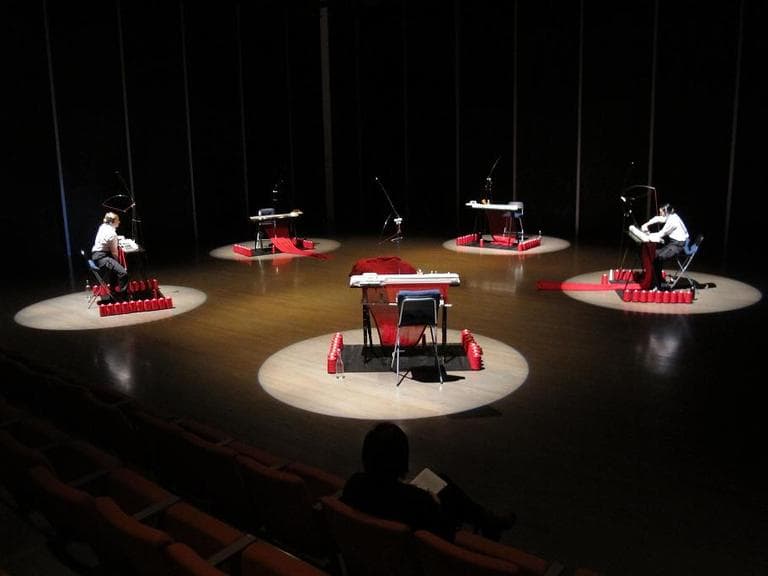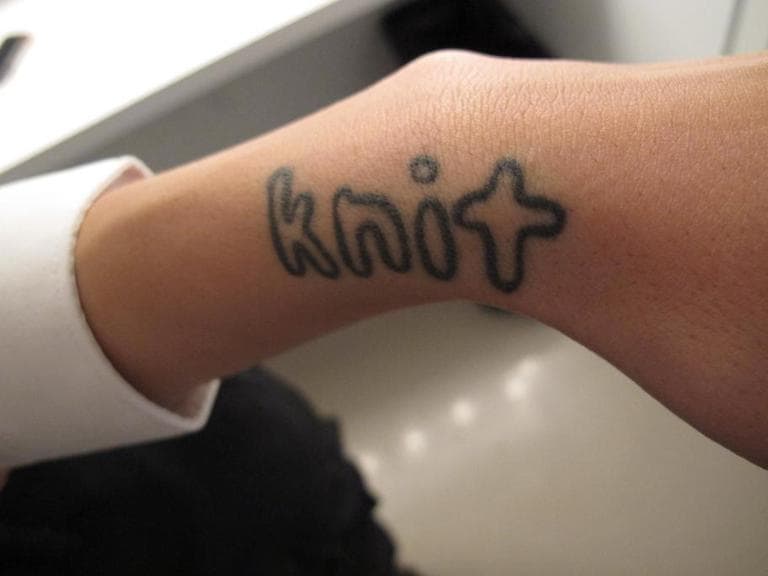Advertisement
An Army Of Knitters Occupies The ICA
ResumeFive women dressed in military garb and donning glossy red lipstick are bathed in light inside a darkened theater. They're foot soldiers in artist and fashion designer Liz Collins' army of knitters. On Friday, members of her army will lead a knitting performance at the Institute of Contemporary Art. It will last all day, and is part of an ongoing installation project that calls attention to the good and the bad in the global textile industry.
When you think of knitting, action and drama probably don’t come to mind — but this is not your grandmother's knitting circle. Here these women man knitting machines.

"This is a very different kind of knitting where you have to engage with the piece of equipment, you have to be very focused on running the machine," Liz Collins, the artist behind "Knitting Nation," said at an earlier knitting performance. "You can’t talk to other people while you’re working or else you might make a mistake, there’s a sound to deal with."
Knitting machines were popular with home hobbyists in the 1970s and '80s. They are also used in the textile industry. Collins is a successful ready-to-wear designer in New York and says what humans can do with these loom-like devices seems alchemical.
"When I first learned to use the knitting machine there was a real spark there for me," Collins recalled. "It really floored me that it was possible to make a piece of fabric with this machine and a strand of yarn in such a fast way — and it just presented limitless possibilities."
So Collins created "Knitting Nation" where, in an installment last month, she and her army of four knitters created wide, bright red sections of cloth for five hours straight — continually adding to a "mother load," as the artist put it, in the center of the room. The spectacle is part performance, part endurance test, part commentary on the global textile industry. What's on display usually happens behind closed doors in factories and workshops. It's a world Collins knows intimately because she's spent countless hours in textile plants as part of her role in the fashion industry.
"There’s not an awareness there when one puts on a sweater that one bought at the Gap that someone with a lot of technical skill and abilities invested in making this piece," Collins said.
Collins is interested in that human element, and she hopes "Knitting Nation" will get audiences thinking and wondering.
"What happens to a body after so many hours of work? Does it start to say ‘I can’t do this anymore? It’s time to stop?’ And sure enough that’s what happens here," Collins explained.
Twenty-three-year-old Lindsay Degen is one of the soldiers who has volunteered her body to the effort. "I'm going to be very sore tomorrow," she mused. Degen has been knitting since she was three, was a student of Collins at the Rhode Island School of Design, and has her own fashion and lifestyle brand in Brooklyn. The word "knit" is tattooed boldly on her wrist.

Another soldier is Zoe Latta, also a former student with a business in New York. She said she's spent hours knitting with needles, but never for five hours non-stop, and never with a knitting machine. Like an athlete or model, Latta had to prepare for this marathon-like show.
"I went on a walk this morning, and I just got my makeup done. I’ve never worn this much lip gloss in my life!" Latta said with a laugh. "I’m having actually a hard time talking, so I guess that’s preparation, in Liz’s mind."
Curious people begin to trickle into the theater. A group of women sit in the front row. They look like hardcore knitters, and it turns out they are — including Georgia Green. She traveled from Lynn to see the show.
"Well, it’s a little boring as a performance," Green admitted.
Her knitting buddy Barbara Kassler agrees. But within moments they're drawn in when a machine gets jammed. Like announcers at a baseball game they supply a running, play-by-play commentary.
Who knew knitting could be a spectator sport?
"I wonder if they have replacements?" Kassler asked, before reflecting, "I think the physicality of it brings to mind the women who used to work in the textile factories, and that’s not very pleasant."
About an hour into the show Latta learns just how unpleasant this kind of labor can be. She stops working and heads backstage to figure out what to do about her hands. Blisters have formed — and popped — because the carriage on her knitting machine doesn't quite fit. It's causing resistance, hence the painful blisters.
"Oh yeah, it's totally like the Ringo Starr moment," Helen Molesworth, the ICA's chief curator said, recalling Starr's exclamation in the Beatles song, "Helter Skelter," after three hours of jamming on his drum kit. Molesworth invited Liz Collins and her "Knitting Nation" to be part of the museum's current exhibition, "Dance/Draw."
"They are really working hard," Molesworth said of the knitters, "and they consider themselves performers so they are playing through the pain."
Despite the blisters and back aches, Liz Collins and her army of four women were determined to carry on. To get through the final hours of their performance they listen to music through headphones — drowning out the loud knitting machines with, in the case of Collins, music by the '80s band the English Beat.


